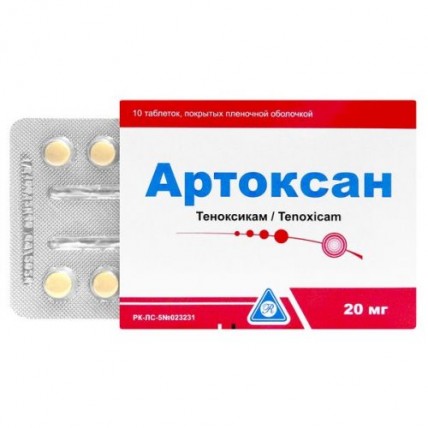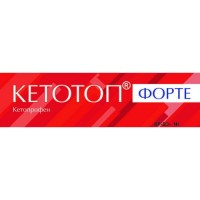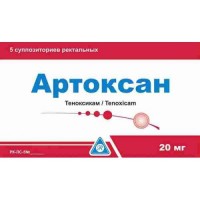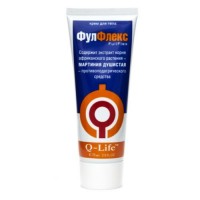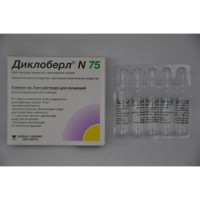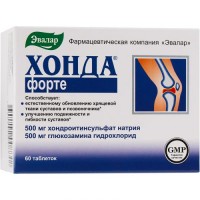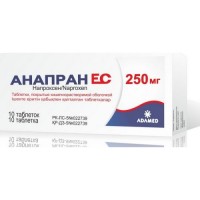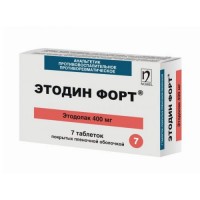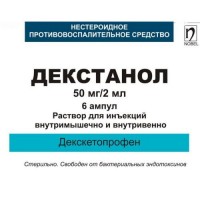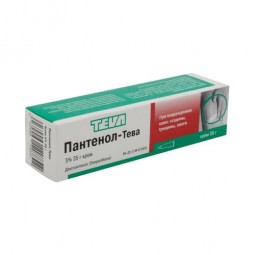Artoxan (Tenoxicam) 20 mg, 10 film-coated tablets
- $15.00
The instruction for medical use of APTOKCAH medicine the Trade name Artoksan Mezhdunarodnoye the unlicensed name Tenoksikam Lekarstvennaya the Tablet form, film coated Structure One tablet contains Active agent: to tenoksika of 20 mg, Excipients: lactoses monohydrate, starch corn prezhelatinizirovanny, talc, magnesium stearate, Structure of a cover: opadr yellow 02F22025 (gipromelloza, titan dioxide (E171), macrogoal 6000, ferrous oxide yellow (E172), talc. Description of the Tablet of round shape, film coated yellow color, biconvex. Pharmacotherapeutic group Drugs for treatment of diseases of a musculoskeletal system. anti-inflammatory and antirheumatic drugs. Non-steroidal anti-inflammatory drugs. Oksikama. Tenoksikam. The code of automatic telephone exchange M01AC02 the Pharmacological Tenoksikam Pharmacokinetics properties is quickly and completely soaked up from the digestive tract (DT), intake of food and antacids slows down absorption speed, without influencing the general extent of absorption. The maximum concentration in blood plasma is reached in 2 hours. Bioavailability of 100%. Drug for 99% contacts proteins of plasma. Distinctive feature of a tenoksikam is the big duration of action and long elimination half-life - 72 hours. Tenoksikam well gets into synovial fluid. Easily gets through gistogematichesky barriers. Is exposed to transformation in a liver with formation of inactive metabolites. Average elimination half-life makes 60-75 hours. Excretion is implemented mainly with urine and partially with bile. Artoksan's pharmacodynamics - effective non-steroidal anti-inflammatory drug (NPVP) with powerful anti-inflammatory, analgeziruyushchy and moderate febrifugal action. Properties of drug are caused by inhibition of both isoforms of enzyme of cyclooxygenase that leads to disturbance of metabolism of arachidonic acid and blockade of synthesis of prostaglandins. The anti-inflammatory effect is caused by reduction of permeability of capillaries (limits exudation), stabilization of lizosomalny membranes (interferes with an exit of enzymes of the lysosomes causing damage of fabrics), oppression of synthesis or an inactivation of mediators of inflammation (prostaglandins, a histamine, bradykinin, lymphokines, complement factors). Reduces the number of free radicals in the inflammation center, the chemotaxis and phagocytosis oppresses. Brakes a proliferative phase of inflammation, reduces a post-inflammatory sklerozirovaniye of fabrics. Has hondroprotektorny effect. Drug stops or reduces intensity of a pain syndrome of any etiology, reduces morning constraint, increases mobility of the affected joints. At long use has the desensibilizing effect. Feature of a tenoksikam is long action. Indications - pain relief and inflammations in an osteoarthritis and a pseudorheumatism, - short-term treatment of acute diseases of the musculoskeletal system, including stretchings, dislocations and other damages of soft tissues. The route of administration and Artoksan's doses accept inside. It is preferable to accept in time or after meal. Drug appoint in a dose 20 mg of 1 times a day at the same time. It is necessary to avoid purpose of higher doses as achievement of clinically significant effect is not observed, at the same time risk of development of side reactions increases. Usually the drug is taken no more than 7 days, but in hard cases the use at most up to 14 days is possible. Side effects the Observed undesirable effects usually were weak and passing. The termination of treatment because of undesirable effects was required from a small amount of patients. In classes according to classification of defeats of systems and bodies the adverse reactions are listed according to the frequency (number of patients at whom emergence of this reaction is expected) using the following designations: Very often (≥1/10) Often (from ≥1/100 to & lt, 1/10) Infrequently (from ≥1/1000 to & lt, 1/100) Seldom (from ≥1/10000 to & lt, 1/1000) Very seldom (& lt, 1/10000) Frequency is unknown (assessment on the basis of the available data is impossible). Disturbances from blood and lymphatic system Frequency is unknown: agranulocytosis, anemia, aplastic anemia, hemolytic anemia, leukopenia, thrombocytopenia, not Werlhof's disease, eosinophilia. Disturbances from the immune system the Frequency is unknown: reactions of hypersensitivity, such as asthma, anaphylactic reactions, Quincke's disease. Disturbances of metabolism and food it is frequent: anorexia. Seldom: metabolism disturbances (for example: hyperglycemia, increase/decrease in body weight). Disturbances of mentality Seldom: sleep disorders (for example, insomnia), depression, nervousness, abnormal dreams. Frequency is unknown: confusion of consciousness, hallucination. Disturbances from nervous system Often: dizziness, headache. Frequency is unknown: drowsiness, paresthesias. Disturbances from an organ of sight the Frequency is unknown: disorders of vision (such as decrease in visual acuity and turbidity of sight), swelling of eyes, irritation of eyes. Disturbances from an organ of hearing and balance it is rare: vertigo. Frequency is unknown: sonitus. Disturbances from heart it is rare: cardiopalmus. Frequency is unknown: heart failure It is necessary to consider the probability of provoking of stagnant heart failure at elderly patients and patients with dysfunction of heart. Disturbances from vessels Seldom: trombotichesky phenomena (for example, myocardial infarction or stroke). Frequency is unknown: vasculitis, hypertensia. Results of clinical and epidemiological trials show that use of selection inhibitors of cyclooxygenase-2 (TsOG-2 inhibitors) and some NPVS (in particular at high doses and for a long time) can lead to small increase in risk of emergence of the arterial trombotichesky phenomena (for example, a myocardial infarction or a stroke). In spite of the fact that to tenoksika did not increase the frequency of emergence of the trombotichesky phenomena, such as myocardial infarction, the available data are insufficient for an exception of similar risk for a tenoksikam. Disturbances from respiratory organs, a thorax and mediastinum it is rare: a bronchospasm, the complicated asthma, an asthma. Frequency is unknown: nasal bleeding. The bronchospasm and the complicated asthma were observed at treatment of NPVS. Disturbances from digestive tract Very often: pain and discomfort in a stomach, epigastric area and abdominal cavity, dyspepsia, nausea, vomiting, meteorism, constipation, indigestion, epigastric discomfort, stomatitis. Often: gastrointestinal bleeding, perforation of digestive tract, a digestive tract ulcer, a round ulcer, sometimes with a lethal outcome, in particular at elderly patients, a hematemesis, a chair with blood, a constipation, an oral cavity ulceration, gastritis, dryness in a mouth, exacerbation of colitis and Crohn's disease (see the Section 4.4 Special Preventions and Precautionary Measures when Using). Very seldom: pancreatitis. Disturbances from a liver and biliary tract Infrequently: increase in levels of liver enzymes. Frequency is unknown: hepatitis, jaundice. Disturbances from skin and hypodermic fabric Infrequently: itching, erythema, dieback, rash, urticaria. Seldom: vezikulo-bullous reactions. Very seldom: heavy adverse skin reactions (HASR): Stephens-Johnson's syndrome, toxic epidermal necrolysis. Frequency is unknown: reaction of photosensitivity. It was reported about exceptional cases of emergence of disturbances from nails and reactions of photosensitivity after treatment of NPVS. Disturbances from kidneys and urinary tract Infrequently: increase in levels of urea or creatinine in blood. Frequency is unknown: nephrotoxicity (for example, a renal failure, interstitial nephrite, a nephrotic syndrome, increase in levels of urea or creatinine in blood). Disturbances from a reproductive system and a mammary gland It was reported about separate cases of female infertility at treatment by the drugs suppressing synthesis of cyclooxygenases/prostaglandins, including tenoksika. Contraindications - hypersensitivity to drug components, acetylsalicylic acid or other NPVP - hypersensitivity (including asthma symptoms, rhinitis, a Quincke's disease or a small tortoiseshell) to salicylates, an ibuprofen, aspirin or other NPVS - active or available in the anamnesis recuring a round ulcer / bleeding (two or more obvious cases of the proved ulceration or bleeding), - gastrointestinal bleeding (melena, a hematemesis), the perforation caused by the previous use of NPVS or heavy gastritis in the anamnesis - the profound abnormal liver functions and kidneys - diabetes - arterial hypertension, heart failure, hypostases - pregnancy, the lactation period - to persons with hereditary intolerance of fructose, deficiency of Lapp-lactases enzyme, glucose galactose malabsorption - children's age up to 18 years. Medicinal interactions Other analgetics, including selection inhibitors of cyclooxygenase-2 It is necessary to avoid simultaneous use of two or more NPVS (including aspirin) as at the same time the risk emergence of adverse effects can increase. Acetylsalicelates and salicylates are capable to force out Salicylates to tenoksika from places of linking with proteins, thus increasing clearance and volume of distribution of the drug Artoksan. For this reason it is necessary to avoid simultaneous use of salicylates as at the same time the risk of emergence of adverse reactions increases (in particular, gastrointestinal). Antacids and antagonists of receptors of H2 Antacids can reduce the drug Artoksan absorption speed, but not its degree. The difference is not clinically significant. Interaction with Cimetidinum accepted at the same time was not observed. Tenoksikam anticoagulants substantially contacts albumine of blood serum and, as well as all NPVS, enhances effects of anticoagulants, such as warfarin. It is recommended to control carefully effects of anticoagulants and oral glycemic means, in particular at the initial stages of the Artoksan drug treatment. Interaction with digoxin was not observed. At healthy subjects clinically significant interaction between the drug Artoksan and heparin with a low molecular weight was not noted. The NPVS cardiac glycosides can aggravate heart failure, reduce glomerular filtration rate and increase levels of cardiac glycosides in blood plasma at simultaneous use with cardiac glycosides. Cyclosporine As well as in a case with other NPVS, is recommended to be careful at simultaneous use of cyclosporine because of the increased risk of nephrotoxicity. Hinolonovy antibiotics Results of researches on animals show that NPVS are capable to increase risk of developing of the spasms caused by hinolonovy antibiotics. The patients accepting NPVS and hinolona can have the increased risk of developing spasms. Lithium Non-steroidal anti-inflammatory drugs reduced lithium removal. When assigning a tenoksikam the patient accepting lithium needs to increase the frequency of monitoring of levels of lithium and to warn the patient about need of consumption of enough liquid and about intoxication symptoms lithium. Diuretics and antihypertensive drugs Non-steroidal anti-inflammatory drugs are capable to cause a delay of sodium, potassium and liquid and to interfere with natriuretic effect of diuretics that can lead to increase in risk of nephrotoxicity of NPVS. It is necessary to remember these features at treatment of patients with dysfunction of heart or hypertensia as they can be susceptible to deterioration in these states. Clinically significant interaction between the drug Artoksan and furosemide was not observed, however the drug Tilkotil weakens the effect of lowering of blood pressure caused by Hydrochlorthiazidum. As is well-known from information on other NPVS, the drug Artoksan can weaken antihypertensive effect of alpha and adrenergic blockers and APF inhibitors. It was not reported about interaction between the drug Artoksan and alpha agonists of the central action or blockers of calcium channels. Clinically significant interaction at simultaneous use of the drug Artoksan with atenolol was not noted. During clinical trials the interaction at the patients who were at the same time taking the foxglove drugs was not observed. Thus, the great risk at simultaneous use of the drug Artoksan and digoxin is not expected. The methotrexate Is recommended to be careful at simultaneous use of a methotrexate because of possible strengthening of its toxicity as it was reported about decrease in removal of a methotrexate under the influence of NPVS. Oral antidiabetic means the Clinical effect of oral antidiabetic means of a glibornurid, glibenclamide, tolbutamide did not change under the influence of the drug Artoksan. Nevertheless, as well as in a case with other NPVS, it is recommended to carry out careful control of the patients who are at the same time accepting oral antidiabetic means. Colestyraminum Colestyraminum can strengthen removal and reduce elimination half-life of a tenoksikam. Dextromethorphan Simultaneous use of a tenoksikam and dextromethorphan can enhance analgetic effect in comparison with monotherapy. Food Extent of absorption of a tenoksikam does not change at a concomitant use of food, but the speed of absorption (Cmax) can be slower, than is able on an empty stomach. Other Simultaneous use of a probenetsid and tenoksikam can increase concentration of a tenoksikam in blood plasma. The clinical importance of this observation is not established. Mifepristone it is not necessary to accept NPVS within 8-12 days after mifepristone use as NPVS can reduce effect of mifepristone. Corticosteroids As well as in a case with all other NPVS, it is necessary to be careful at simultaneous use of corticosteroids because of the increased risk of developing of a gastrointestinal ulcer or bleeding. Antithrombocytic means and the selective serotonin reuptake inhibitors (SSRI) of Risk of developing of gastrointestinal bleeding raises at simultaneous use of antithrombocytic means and the selective serotonin reuptake inhibitors (SSRI) with NPVS. Takrolimus Risk of nephrotoxicity raises at use of NPVS with takrolimusy. Risk zidovudine of hematologic toxicity increases at use of NPVS together with a zidovudine. The HIV-positive patients with hemophilia who are at the same time accepting a zidovudine and an ibuprofen have evidence of increase in risk of developing of a hemarthrosis and hematomas. Special instructions Gastrointestinal bleeding, an ulcer and perforation of ZhK bleeding, an ulcer or perforation which can have a lethal outcome were observed at use of all NPVS at any moment of a course of treatment at existence or lack of the warning symptoms or serious ZhK of the phenomena in the anamnesis. Risk of emergence of ZhK of bleeding, an ulcer or perforation raises at increase in a dose of NPVS and also at patients with an ulcer in the anamnesis, in particular with the ulcer complicated by bleeding or perforation and at elderly patients. Such patients should begin treatment with the minimum possible dose. It is necessary to consider the possibility of the combined treatment by protective equipment (for example, mizoprostoly or inhibitors of the proton pump) at such patients and also at patients who need use of low doses of aspirin or other drugs capable to increase gastrointestinal risk. Patients with ZhK toxicity in the anamnesis, in particular, elderly patients, have to report about all unusual symptoms from a stomach (in particular about ZhK bleedings), especially in an initiation of treatment. It is necessary to be careful at treatment of the patients who are at the same time taking the drugs capable to increase risk of an ulceration or bleeding, such as oral corticosteroids, anticoagulants, for example, warfarin, selective serotonin reuptake inhibitors or antithrombocytic means, such as aspirin. At emergence of ZhK of bleeding or ulcer at the patients accepting to tenoksika it is necessary to stop treatment. It is necessary to be careful at use of NPVS for patients with gastrointestinal diseases (ulcer colitis, a disease of Kr
on) in the anamnesis as similar states can become aggravated. Disturbances from a respiratory system It is necessary to be careful at treatment of patients with the bronchial asthma which is available or specified in the anamnesis as the ibuprofen caused a bronchospasm in such patients. Cardiovascular and cerebrovascular effects the Corresponding monitoring and consultations are necessary for patients with hypertensia and/or moderate stagnant heart failure in the anamnesis as it was reported about a delay of liquid and hypostasis at treatment of NPVS. Results of clinical and epidemiological trials show that use of some NPVS (in particular in high doses and at long treatment) can cause small increase in risk of the arterial trombotichesky phenomena (for example, a myocardial infarction or a stroke). Data are insufficient for an exception of similar risk for a tenoksikam. Patients with uncontrollable hypertensia, the stagnant heart failure established by coronary heart disease, a disease of peripheral arteries and/or a cerebrovascular disease can be exposed to treatment only the tenoksikamy ambassador of careful assessment. Similar assessment is required before long-term treatment of patients with risk factors of a cardiovascular disease (for example, hypertensia, a lipidemia, diabetes, smoking). The drug Artoksan contains lactose. Patients with rare hereditary problems of intolerance of a galactose, a lactose intolerance of Lapp or malabsorption of glucose galactose should not take this drug. Use in pediatrics Drug is contraindicated to use for children and teenagers up to 18 years (in a type of insufficiency of clinical data). Pregnancy and a lactation Drug is contraindicated to use during pregnancy and in the period of a lactation. Tenoksikam and his metabolites get into breast milk therefore drug is not recommended to be used during breastfeeding. The feature of influence of medicine on ability to run the vehicle or potentially dangerous mechanisms during treatment needs to abstain from occupations potentially dangerous types of activity demanding the increased concentration of attention and speed of psychomotor reactions. Overdose Symptoms: strengthening of side effects is noted. Treatment: specific antidote does not exist. At suspicion on overdose of a tenoksikam the symptomatic therapy is recommended. A form of release and packing On 10 tablets in blister strip packaging from a film of polyvinylchloride and aluminum foil. On 1 blister strip packaging together with the instruction for medical use in the state and Russian languages place in a cardboard box. To Store storage conditions at a temperature not above 25 °C. To store out of children's reach! 3 years not to apply a period of storage after an expiration date. Prescription status According to the prescription the Producer/packer Uorld Meditsin Ilach Sang. ve Tidzh. A.Sh., Turkey (Bagdzhylar Ilchesi, Gyuneshli, Evren Makhallesi, Dzhami Yolu Dzhad. No. 50 K. 1B Zemin 4-5-6, Istanbul) World Medicine İlaç San. ve Tic. A.Ş., Turkey (Bağcılar İlçesi, Güneşli, Evren Mahallesi, Cami Yolu Cad. No: 50 K. 1B of Zemin 4-5-6, İstanbul). The owner of the registration certificate of ROTAFARM ILACHLARY LIMITED of SHIRKETI, TURKEY the Address of the organization accepting in the territory of the Republic of Kazakhstan claims from consumers on quality of products of RK, Almaty, TROKA-S PHARMA LLP, Suyunbaya Ave., 222 B Ph. / fax: 8 (7272) 529090 Address of the organization responsible for post-registration observation of safety of medicine: TROKA-S PHARMA LLP, RK, Almaty, Suyunbaya Ave., 222 B Cellular ph. +7 701 786 33 98, (24-hour access).
To develop
on) in the anamnesis as similar states can become aggravated. Disturbances from a respiratory system It is necessary to be careful at treatment of patients with the bronchial asthma which is available or specified in the anamnesis as the ibuprofen caused a bronchospasm in such patients. Cardiovascular and cerebrovascular effects the Corresponding monitoring and consultations are necessary for patients with hypertensia and/or moderate stagnant heart failure in the anamnesis as it was reported about a delay of liquid and hypostasis at treatment of NPVS. Results of clinical and epidemiological trials show that use of some NPVS (in particular in high doses and at long treatment) can cause small increase in risk of the arterial trombotichesky phenomena (for example, a myocardial infarction or a stroke). Data are insufficient for an exception of similar risk for a tenoksikam. Patients with uncontrollable hypertensia, the stagnant heart failure established by coronary heart disease, a disease of peripheral arteries and/or a cerebrovascular disease can be exposed to treatment only the tenoksikamy ambassador of careful assessment. Similar assessment is required before long-term treatment of patients with risk factors of a cardiovascular disease (for example, hypertensia, a lipidemia, diabetes, smoking). The drug Artoksan contains lactose. Patients with rare hereditary problems of intolerance of a galactose, a lactose intolerance of Lapp or malabsorption of glucose galactose should not take this drug. Use in pediatrics Drug is contraindicated to use for children and teenagers up to 18 years (in a type of insufficiency of clinical data). Pregnancy and a lactation Drug is contraindicated to use during pregnancy and in the period of a lactation. Tenoksikam and his metabolites get into breast milk therefore drug is not recommended to be used during breastfeeding. The feature of influence of medicine on ability to run the vehicle or potentially dangerous mechanisms during treatment needs to abstain from occupations potentially dangerous types of activity demanding the increased concentration of attention and speed of psychomotor reactions. Overdose Symptoms: strengthening of side effects is noted. Treatment: specific antidote does not exist. At suspicion on overdose of a tenoksikam the symptomatic therapy is recommended. A form of release and packing On 10 tablets in blister strip packaging from a film of polyvinylchloride and aluminum foil. On 1 blister strip packaging together with the instruction for medical use in the state and Russian languages place in a cardboard box. To Store storage conditions at a temperature not above 25 °C. To store out of children's reach! 3 years not to apply a period of storage after an expiration date. Prescription status According to the prescription the Producer/packer Uorld Meditsin Ilach Sang. ve Tidzh. A.Sh., Turkey (Bagdzhylar Ilchesi, Gyuneshli, Evren Makhallesi, Dzhami Yolu Dzhad. No. 50 K. 1B Zemin 4-5-6, Istanbul) World Medicine İlaç San. ve Tic. A.Ş., Turkey (Bağcılar İlçesi, Güneşli, Evren Mahallesi, Cami Yolu Cad. No: 50 K. 1B of Zemin 4-5-6, İstanbul). The owner of the registration certificate of ROTAFARM ILACHLARY LIMITED of SHIRKETI, TURKEY the Address of the organization accepting in the territory of the Republic of Kazakhstan claims from consumers on quality of products of RK, Almaty, TROKA-S PHARMA LLP, Suyunbaya Ave., 222 B Ph. / fax: 8 (7272) 529090 Address of the organization responsible for post-registration observation of safety of medicine: TROKA-S PHARMA LLP, RK, Almaty, Suyunbaya Ave., 222 B Cellular ph. +7 701 786 33 98, (24-hour access).
To develop
